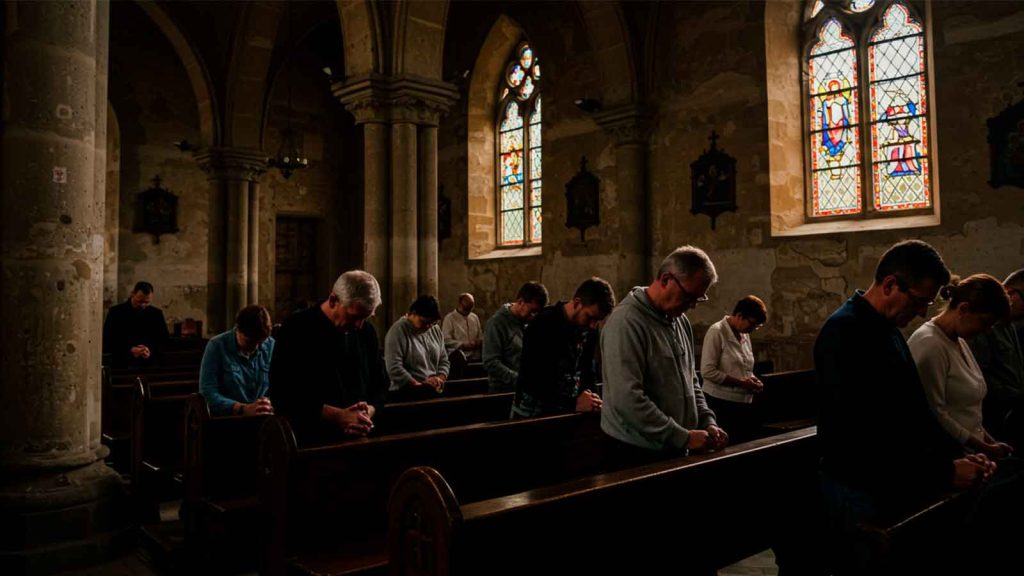Psalm 85 is one of the most moving and meaningful texts in the Book of Psalms. It voices a heartfelt plea for the people’s restoration, invoking divine mercy and reaffirming hope in forgiveness and reconciliation.
In this article we will explore every aspect of Psalm 85—its historical background, spiritual meaning and hidden messages—offering practical reflections for everyday life.
Psalm 85 – Full Text
1 You showed favor, LORD, to your land; you restored the fortunes of Jacob.
2 You forgave the iniquity of your people and covered all their sins. Selah.
3 You withdrew all your wrath and turned from your fierce anger.
4 Restore us again, God our Savior, and put away your displeasure toward us.
5 Will you be angry with us forever? Will you prolong your anger through all generations?
6 Will you not revive us again, that your people may rejoice in you?
7 Show us your unfailing love, LORD, and grant us your salvation.
8 I will listen to what God the LORD says; he promises peace to his people, his faithful servants—let them not turn to folly.
9 Surely his salvation is near those who fear him, that his glory may dwell in our land.
10 Mercy and truth have met together; righteousness and peace have kissed.
11 Truth springs up from the earth, and righteousness looks down from heaven.
12 The LORD indeed will give what is good, and our land will yield its harvest.
13 Righteousness goes before him and prepares a way for his steps.

Explanation of Psalm 85
Psalm 85:1
You showed favor, LORD, to your land; you restored the fortunes of Jacob.
The psalmist begins by acknowledging that God has already acted graciously in the past. “Land” symbolizes the promise, and “captivity of Jacob” refers to Israel’s restoration after exile. There is gratitude for the blessings granted.
Psalm 85:2
You forgave the iniquity of your people and covered all their sins. Selah.
Here we see forgiveness as a concrete act of God. He not only removes guilt but “covers” it—he no longer takes it into account. “Selah” signals a reflective pause before the greatness of divine pardon.
Psalm 85:3
You withdrew all your wrath and turned from your fierce anger.
God ceased the judgment that had been deserved. His “indignation” has ended and the “fierce anger” is turned aside, showing God’s movement toward reconciliation with his people.
Psalm 85:4
Restore us again, God our Savior, and put away your displeasure toward us.
Although they have already experienced restoration, the psalmist asks for continual renewal. The plea is for ongoing salvation and the complete removal of any remaining divine wrath.
Psalm 85:5
Will you be angry with us forever? Will you prolong your anger through all generations?
This rhetorical question reveals the people’s anguish under prolonged suffering. It is an emotional appeal that God not keep his anger indefinitely.
Psalm 85:6
Will you not revive us again, that your people may rejoice in you?
The psalmist longs for spiritual renewal. To “revive” means to restore full life—both physical and spiritual. Joy in the Lord is tied to renewed faith and fellowship.
Psalm 85:7
Show us your unfailing love, LORD, and grant us your salvation.
This is a direct appeal: that God visibly reveal his mercy and once more grant salvation—understood as deliverance and blessing.
Psalm 85:8
I will listen to what God the LORD says; he promises peace to his people, his saints—let them not return to folly.
The psalmist adopts a posture of listening, confident that God will speak words of peace. “Folly” here represents rebellion and wrong paths that must be avoided.
Psalm 85:9
Surely his salvation is near those who fear him, that his glory may dwell in our land.
Salvation is not far off—it is promised to those who revere God. When that happens, “glory”—God’s presence—comes to dwell among the people.
Psalm 85:10
Mercy and truth have met together; righteousness and peace have kissed.
This verse poetically expresses the union of divine attributes. “Mercy” aligns with “truth,” while “righteousness” harmonizes with “peace,” signaling a time of spiritual fullness and balance.
Psalm 85:11
Truth springs up from the earth, and righteousness looks down from heaven.
There is an encounter between the human and the divine: “truth” rises from the earth—perhaps from upright hearts—while “righteousness” comes down from God above.
Psalm 85:12
The LORD indeed will give what is good, and our land will yield its harvest.
Divine action is also manifested in material blessings. The land bears fruit as a consequence of spiritual renewal and God’s presence among the people.
Psalm 85:13
Righteousness goes before him and prepares a way for his steps.
God’s righteousness opens the way. By following the Lord’s “footsteps,” the people embark on a secure and straight path—pointing to direction, purpose and faithfulness.

The Historical Context of Psalm 85
Psalm 85 was written at a time of deep need. The people of Israel had returned from Babylonian exile, yet the land was still devastated. The psalmist begs for divine favor to restore prosperity and joy. Understanding this context helps capture the intensity of the plea in Psalm 85 and the collective longing for renewal.
Structure and Themes of Psalm 85
Psalm 85 can be divided into three main sections.
Psalm 85:1-3 – Remembering Past Blessings
The psalmist recalls God’s wonderful deeds in the past—how he forgave sins, turned away wrath and showed kindness. This remembrance forms the basis for the present plea.
Psalm 85:4-7 – Plea for Restoration
Here we find the emotional core of Psalm 85. The psalmist petitions God to restore the people once again, removing his anger and pouring out mercy.
Psalm 85:8-13 – Confidence in the Divine Answer
Psalm 85 concludes with words of hope and trust. The psalmist believes that God will hear the cry and bring peace, justice and prosperity.
The Spiritual Meaning of Psalm 85
The Spiritual Meaning of Psalm 85
Psalm 85 offers deep lessons about the relationship between humanity and the divine. It shows that even in times of adversity we can trust in God’s forgiveness and goodness. The psalm also underscores the importance of sincere repentance and a desire for reconciliation. Let us explore these dimensions more closely.
Trust in Divine Forgiveness
Psalm 85 emphasizes that God is always ready to forgive. Even when the people faced punishment for their errors, there was confidence that God would not remain angry forever. This is a powerful reminder: no matter how great our failures, repentance opens the door to a new beginning.
- Forgiveness as spiritual renewal: Forgiveness is not just the cancellation of guilt but an invitation to live a transformed life.
- Confidence amid adversity: The psalmist teaches us to keep faith even when we feel distant from God, for he is compassionate.
Sincere Repentance
Another essential point in Psalm 85 is the value of genuine repentance. It is not merely words or outward gestures but a broken heart that acknowledges its errors and seeks restoration.
- Recognizing one’s limitation: The psalmist admits that the people cannot free themselves from suffering.
- Seeking reconciliation: Repentance aims to mend the broken relationship between humanity and God.
The Role of Hope
Psalm 85 also carries a message of hope. Even when everything seems lost, the psalmist’s voice declares confidence in a better future rooted in God’s mercy and justice.
- Collective hope: It is not just individual but shared by the community.
- Active hope: Hope involves continuous prayer and vigilance, not passive waiting.
Reconciliation with God
Reconciliation is the great spiritual goal presented in Psalm 85. The relationship between God and his people is restored not only to relieve hardship but to establish a new life marked by peace and justice.
- Union of justice and peace: When God acts, he brings lasting transformation, not just momentary relief.
- Life aligned with divine purposes: The psalm ends by pointing to a path of righteousness as the faithful follow the Lord’s steps.

Practical Lessons from Psalm 85 for Everyday Life
Trust in Forgiveness
Psalm 85 encourages us to trust in forgiveness, knowing that God is merciful and always willing to listen.
Hope in Restoration
Even when circumstances seem impossible, Psalm 85 reminds us that restoration is possible through faith.
The Importance of Gratitude
By recalling past blessings, we are motivated to cultivate a grateful heart, as exemplified in Psalm 85.
Reflections on Mercy in Psalm 85
Mercy is a central theme in Psalm 85. It serves as a bridge between past and future, showing that the people’s story is still being written on the foundation of divine love. Let us explore this concept more broadly.
Mercy as a Transforming Action
In Psalm 85, mercy is not just a passive feeling or superficial emotion. It is presented as a living, concrete force that transforms reality.
- Mercy that restores: God not only feels compassion for the people’s suffering but acts to restore what was lost—rebuilding, renewing and re-establishing the broken bond.
- Mercy that forgives: The forgiveness in Psalm 85 is neither partial nor conditional. God completely covers sins, removing barriers that separated the people from his presence.
Mercy as Peace
Another deep aspect of Psalm 85 is the link between mercy and peace. The psalmist makes it clear that true peace is born not merely from human agreements or external change but from reconciliation with God.
- Inner peace: Where mercy is present, serenity of heart also arises. The people feel welcomed and loved once more.
- Community peace: Mercy’s effect extends beyond the individual, transforming the whole community and bringing harmony and stability.
Mercy as a Path to Justice
Psalm 85 shows that mercy does not cancel justice but completes it. God acts justly when he shows mercy, creating a path where equity and love unite.
- Justice with tenderness: Mercy does not mean God ignores sin; rather, he deals with it compassionately, offering redemption.
- Path of righteousness: From divine mercy, the faithful are called to walk in justice, reflecting God’s character in their actions.
Mercy as a Sign of Divine Love
Ultimately, the mercy revealed in Psalm 85 is a powerful expression of God’s love. It arises not out of obligation but of a loving choice.
- Constant love: Even when the people fail, God remains faithful and merciful.
- Love that generates hope: Knowing that God is merciful strengthens hope for a better future, where wounds are healed and the land bears fruit again.
Final Reflection on Mercy in Psalm 85
Psalm 85 invites us to contemplate divine mercy as a dynamic, transforming reality. It is not merely a theological theme but a practical experience that renews lives, strengthens communities and offers genuine peace. This mercy is the thread that links past to future, ensuring that after difficult times there is always room to begin again under God’s loving gaze.
Hope in Psalm 85
Hope is one of the guiding threads in Psalm 85. It appears as a response to repentance, as fuel for prayer and as a promise that God will not abandon his people. Let us explore this spiritual dimension more deeply.
Collective Hope
Psalm 85 speaks not only of an individual cry but of collective hope. It reveals the power of a community united in faith, crying out not just for personal benefit but for the common good.
- Strength in unity: Hope is strengthened when the people come together in prayer and supplication—it is not a solitary journey but a communal movement raising its voice to God.
- Restoration of the nation: The psalmist pleads for renewal of the land, harvests and collective peace. Individual well-being is intertwined with the restoration of the whole community.
- Confidence in divine action: The collective hope expressed in Psalm 85 shows that the people’s faith rests not merely on current circumstances but on steadfast trust in God’s character.
Hope for the Future
The psalmist envisions a promising future where goodness, justice and peace meet in perfect harmony. This vision is not a distant dream but a concrete promise rooted in divine faithfulness.
- Prophetic vision: Psalm 85 looks ahead to a time when the land will yield its fruit and the people will live in fullness—a reality transformed by God’s presence and justice.
- Certainty of change: Even amid difficulties, the psalmist keeps alive the expectation that God will continue to act. Hope is not passive waiting but active trust in divine intervention.
- Peace and harmony: The final expectation is not merely material prosperity but true peace born from the meeting of divine justice and mercy.
Hope as a Foundation of Faith
In Psalm 85, hope is neither vague nor abstract; it is a solid foundation that sustains the people’s faith amid challenges.
Transforming hope: Hope not only consoles but inspires change, sparking renewed commitment to God’s ways.
Hope rooted in memory: Remembering past blessings strengthens confidence in the future.
Hope as a guide: This expectation directs present actions, leading the people to seek reconciliation, justice and holiness.
Poetic Language and Symbolism in Psalm 85
Psalm 85 is filled with poetic images that enrich its meaning. It uses the land, peace and justice as symbolic elements to describe the relationship with God.
The Land that Bears Fruit
The land in Psalm 85 represents tangible blessing—the visible response to faith.
Justice and Peace
These concepts in Psalm 85 appear as entities that kiss, indicating harmony and fullness.
Applying Psalm 85 in Practical Life
Remember and Give Thanks
The Psalm invites us to look back and thank God for all he has already done.
Pray with Confidence
Even in hard times, we can follow Psalm 85’s example and pray with hope.
Live with Hope
The hope of Psalm 85 inspires us to live confidently, trusting in divine goodness.
FAQ about Psalm 85
What is Psalm 85?
Psalm 85 is a prayer for restoration and mercy, written in a context of collective need.
What is the central message of Psalm 85?
The message of Psalm 85 revolves around forgiveness, hope and trust in God’s action.
How can Psalm 85 be applied today?
We can apply Psalm 85 as a reminder to pray with hope, trust in restoration and practice gratitude.
What do justice and peace symbolize in Psalm 85?
In Psalm 85, justice and peace symbolize the harmony that results from reconciliation with God.
Why is Psalm 85 important?
Psalm 85 is important because it teaches about repentance, hope and the strength of communal faith.
Conclusion
This text has led us through a profound reflection on essential spiritual themes—repentance, mercy, justice, peace and hope. It shows that even when we face difficult moments, renewal and transformation are always possible.
Remembering past blessings strengthens faith in the present and projects confidence into the future. The cry for restoration is not merely an isolated plea but an invitation for the whole community to unite in pursuit of a more just and harmonious path.
The final message is clear: God continues to act. His love and compassion are inexhaustible sources of new life, capable of transforming not only external circumstances but also hearts. Whoever trusts in him learns to walk with patience, gratitude and confidence, knowing that divine justice always prepares a path of peace and goodness for those who follow him.
READ ALSO:
- Psalm 76: Deep Reflections and Meanings
- Psalm 75: Acknowledging Divine Justice and God’s Power
- Psalm 74: Reflections on Divine Presence in Times of Crisis
FOLLOW US ON FACEBOOK
We hope you enjoyed this article.